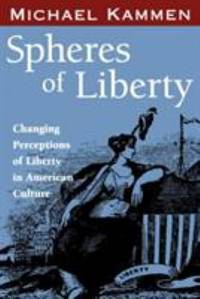
Spheres of Liberty : Changing Perceptions of Liberty in American Culture Paperback - 2001
by Michael G. Kammen
- Used
- Good
- Paperback
Description
NZ$14.81
FREE Shipping to USA
Standard delivery: 4 to 8 days
More Shipping Options
Ships from ThriftBooks (Washington, United States)
Details
- Title Spheres of Liberty : Changing Perceptions of Liberty in American Culture
- Author Michael G. Kammen
- Binding Paperback
- Condition Used - Good
- Pages 222
- Volumes 1
- Language ENG
- Publisher University Press of Mississippi, Jackson, Mississippi, U.S.A.
- Date 2001
- Illustrated Yes
- Features Illustrated, Index, Table of Contents
- Bookseller's Inventory # G1578063949I3N00
- ISBN 9781578063949 / 1578063949
- Weight 0.69 lbs (0.31 kg)
- Dimensions 8.98 x 6.04 x 0.56 in (22.81 x 15.34 x 1.42 cm)
- Library of Congress subjects Political science - United States - History, Liberty - History
- Library of Congress Catalog Number 2001026734
- Dewey Decimal Code 323.440
About ThriftBooks Washington, United States
Biblio member since 2018
From the largest selection of used titles, we put quality, affordable books into the hands of readers
